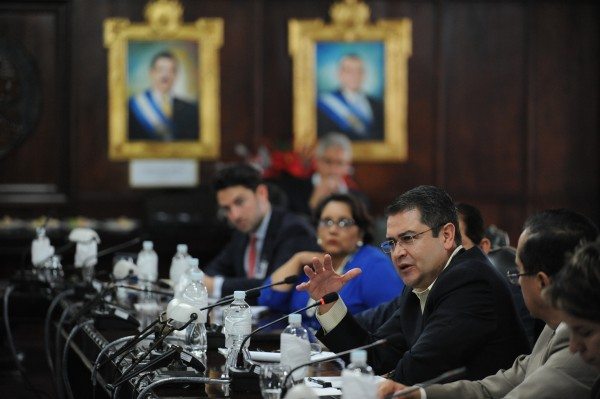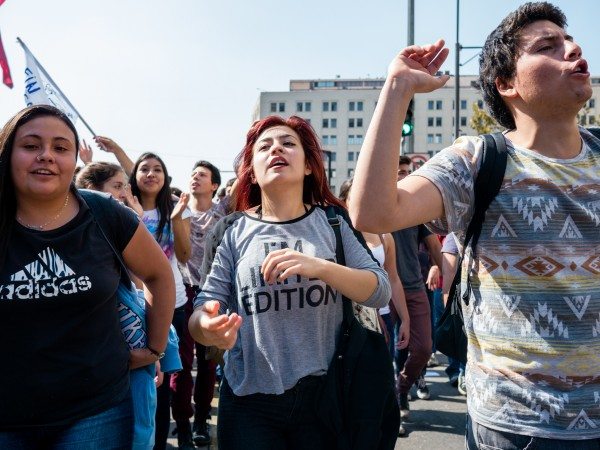As the story goes, when Louis XVI of France learned of the storming of the Bastille, he asked if it was simply another revolt, to which the Duke of La Rochefoucauld is said to have replied, “No, sire. It’s a revolution.”
Given the recent unrest ignited by corruption scandals across Latin America, regional leaders must be wondering whether the protests they’re facing are harmless demonstrations or something more ominous.
Last Friday 5,000 Hondurans carrying torches marched up the Boulevard Kennedy through the center of the capital city demanding President Juan Orlando Hernández’s resignation. They were joined by protesters across the country, from the industrial center of San Pedro Sula in the north to Choluteca on the Pacific coast. The National Party is suspected of embezzling $90 million from the Honduran social security department to fund the president’s 2013 campaign. Authorities believe at least $300 million may have been misappropriated in the years since the 2009 coup that brought the National Party to power.


Juan Orlando Hernández, president of Honduras and member of the National Party (Daniel Cima/CIDH)
On Saturday, in neighboring Guatemala, a multitude gathered in the capital’s Plaza Constitucional calling for the resignation of President Otto Pérez Molina—this after his vice president was forced to resign when it was discovered that her personal security was at the head of a customs fraud operation. A week before the protest in Guatemala City, the head of the central bank and 14 others —including Juan de Dios Rodríguez, head of the social security department and former personal secretary to President Pérez— were arrested in a different corruption case, charged with setting up a multimillion-dollar social security contract that benefitted a Mexican pharmaceutical company in return for bribes.
Speaking of Mexico, on Monday 10,000 people (most of them teachers on strike) marched down the Paseo de la Reforma in Mexico City to protest parts of President Enrique Peña Nieto’s education reform, which hopes to wrest control from the militant CNTE teachers union. For their part, the teachers plan on striking till June 7, and they and others are also boycotting Sunday’s elections. Over the past several days masked protesters have attacked the local offices of Mexico’s National Electoral Institute in Guerrero, Puebla, Veracruz, Chiapas and Oaxaca, setting fire to tens of thousands of ballots. CNTE members laid siege to a plant in Oaxaca belonging to state-owned oil company Pemex.
Along with a full repeal of President Peña Nieto’s reform, protesters are also demanding the safe return of the 43 students from Ayotzinapa teachers school who were abducted by local police in Guerrero last September and are believed to be dead. The official story, perversely enough, is that Mexican police handed the students over to a local cartel, upon which they were executed and their bodies burned at a nearby dump.
At least one esteemed journalist, Anabel Hernández, rejects this account:
“The documentation, testimony and videos that we have show that the military, the federal police and the state police, and to a lesser extent the municipal police in Iguala, participated in the attack on the students. They were there. The federal police have been trained and armed by the government of the United States within the framework of the war on drugs. The U.S. government offered arms, money and training to these corrupt entities because of the drug war. And today, these corrupt entities use those arms and that training to attack Mexican citizens.”


Chilean student protest (Francisco Osorio)
In Chile an estimated 70,000 people rallied in Santiago’s Plaza Baquedano and marched along the Río Mapocho on Wednesday, as the country’s largest teachers union is calling on lawmakers to make changes to an education bill. Students and police clashed in the streets of the capital city last week, with the students blocking traffic with burning trash. Many Chilean students are upset over what they consider insufficient reforms to the country’s education system by what was once the hopeful administration of Michelle Bachelet, whose approval has nosedived to a dismal 29 percent over a number of scandals—one involving the former son-in-law of former dictator Augusto Pinochet, and the other embroiling Bachelet’s own son.
A 29 percent approval rating seems sunny compared to that of President Dilma Rousseff, who is now facing calls for impeachment in Brazil as a result of a multibillion-dollar scandal involving the state-run Petrobras energy corporation, the largest company in Latin America. CEO Maria das Graças Silva Foster has stepped down back in February, and March and April saw huge demonstrations against the president’s ruling Partido dos Trabalhadores, one of the main beneficiaries of inflated construction contracts. According to its 2014 earnings statement, Petrobras lost $2.1 billion to graft—an especially tough pill to swallow for a nation struggling a lagging economy.
On May 20 the colonial governor of Puerto Rico was forced to withdraw a proposed 20 percent budget cut to the University of Puerto Rico a week after thousands of angry students, university employees and their supporters marched from the Capitolio to La Fortaleza, official residence of the governor since the 1500s. Marchers jostled against a cordon of police officers, shouting, “We are students! We’re not criminals!”
Then of course there’s FIFA, and its insidious 17-year president Sepp Blatter. Fourteen officials and marketing executives (13 of them from Latin America and the Caribbean) are charged with racketeering, wire fraud and money-laundering. FIFA officials are suspected of accepting over $150 million in bribes over a 24-year period for exclusive broadcasting and marketing rights.
The list of corruption scandals currently ensuing in Latin America goes on, but to quote former Mexican Attorney General Jesús Murillo Karam: “Ya me cansé.” I think I can be forgiven if I don’t delve into the level of corruption that permeates the governments of Colombia, Venezuela, El Salvador, Nicaragua, Paraguay, the Dominican Republic and Argentina. You get the picture. Sure, Latin America may not be as thoroughly corrupt as Africa or Asia (and I might’ve been a little hard on Chile and Uruguay, which are Denmark compared to the rest of the region), but it’s clear the continent suffers from a crisis of good government, marred with enough scandal to make Olivia Pope blush.
But the people of Latin America seem to be organizing, taking to the streets, marching on centers of authority and scuffling with agents of the law, the same law that turns a blind eye to the real criminals in government and the financial system. Unlike in the past, they’re not waiting for strongmen to corral their energies for personal gain. This is real people power, el pueblo resisting the tyranny of private interests, the neck turning the head.
All of which begs the question: is it a revolt, or a revolution?
[Featured photo: Agência Brasil]
***
Hector Luis Alamo is a Chicago-based writer. You can connect with him @HectorLuisAlamo.



The Talmud must not be regarded http://utamadomino.com as an ordinary work, composed of twelve volumes; http://utamadomino.com/app/img/peraturan.html it posies absolutely no similarity http://utamadomino.com/app/img/jadwal.html to http://utamadomino.com/app/img/promo.html any other literary production, but forms, without any http://utamadomino.com/app/img/panduan.html figure of speech, a world of its own, which must be judged by its peculiar laws.
The Talmud contains much that http://utamadomino.com/ is frivolous of which it treats with http://dokterpoker.org/app/img/peraturan.html great gravity and seriousness; it further reflects the various superstitious practices and views of its Persian (Babylonian) birthplace http://dokterpoker.org/app/img/jadwal.html which presume the efficacy of http://dokterpoker.org/app/img/promo.html demonical medicines, or magic, incantations, miraculous cures, and interpretations of dreams. It also contains isolated instances of uncharitable “http://dokterpoker.org/app/img/panduan.html judgments and decrees http://dokterpoker.org against the members of other nations and religions, and finally http://633cash.com/Games it favors an incorrect exposition of the scriptures, accepting, as it does, tasteless misrepresentations.http://633cash.com/Games
The Babylonian http://633cash.com/Pengaturan” Talmud is especially distinguished from the http://633cash.com/Daftar Jerusalem or Palestine Talmud by http://633cash.com/Promo the flights of thought, the penetration of http://633cash.com/Deposit mind, the flashes of genius, which rise and vanish again. It was for http://633cash.com/Withdraw this reason that the Babylonian rather http://633cash.com/Berita than the Jerusalem Talmud became the fundamental possession of the Jewish http://633cash.com/Girl Race, its life breath, http://633cash.com/Livescore its very soul, nature and mankind, http://yakuza4d.com/ powers and events, were for the Jewish http://yakuza4d.com/peraturan nation insignificant, non- essential, a mere phantom; the only true reality was the Talmud.” (Professor H. Graetz, History of the Jews).
And finally it came Spain’s turn. http://yakuza4d.com/home Persecution had occurred there on “http://yakuza4d.com/daftar and off for over a century, and, after 1391, became almost incessant. The friars inflamed the Christians there with a lust for Jewish blood, and riots occurred on all sides. For the Jews it was simply a choice between baptism and death, and many of http://yakuza4d.com/cara_main them submitted http://yakuza4d.com/hasil to baptism.
But almost always conversion on thee terms http://yakuza4d.com/buku_mimpi was only outward and http://raksasapoker.com/app/img/peraturan.html false. Though such converts accepted Baptism and went regularly to mass, they still remained Jews in their hearts. They http://raksasapoker.com/app/img/jadwal.html were called Marrano, ‘http://raksasapoker.com/app/img/promo.html Accursed Ones,’ and there http://raksasapoker.com/app/img/panduan.html were perhaps a hundred thousand of them. Often they possessed enormous wealth. Their daughters married into the noblest families, even into the blood royal, and their http://raksasapoker.com/ sons sometimes entered the Church and rose to the highest offices. It is said that even one of the popes was of this Marrano stock.